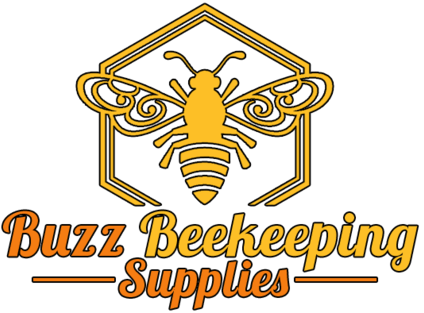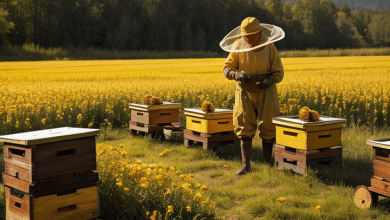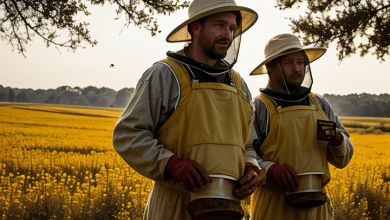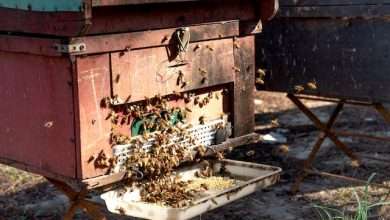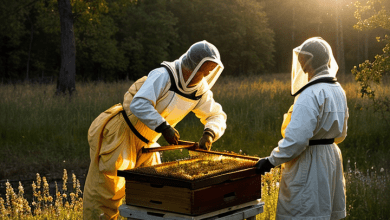Beekeeping Supplies Mississippi
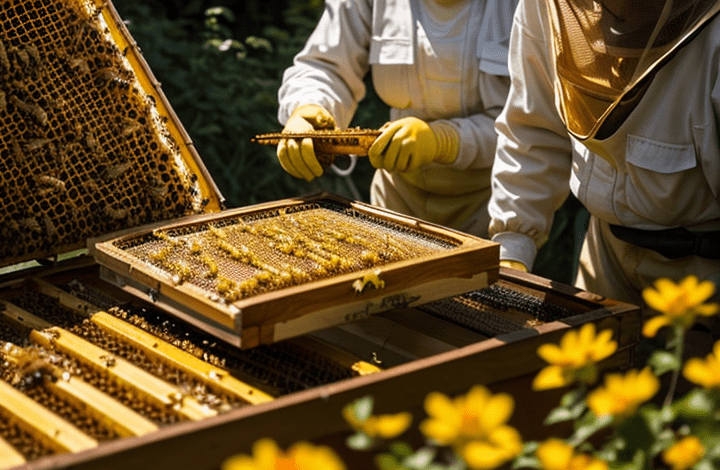
Beekeeping has been an integral part of agriculture and environmental sustainability in Mississippi for many years. With the growing interest in urban beekeeping and the increasing awareness of the importance of bees in our ecosystem, the beekeeping industry in Mississippi is thriving.
In this article, we will explore the essential supplies needed for successful beekeeping in Mississippi, where to purchase them, the regulations and guidelines to follow, and valuable tips for beginners.
No matter where you are looking for Beekeeping Supplies in Mississippi, we’ve got you covered.
The Importance of Beekeeping in Mississippi:
- Mississippi ranks 17th in the United States in honey production, with an estimated 900 beekeepers in the State.
- Beekeeping plays a crucial role in the pollination of crops, ensuring bountiful harvests for farmers across Mississippi.
- The honey produced by bees in Mississippi is known for its distinct flavor profiles, attracting consumers both locally and globally.
- Beekeeping supports the local economy by creating job opportunities and contributing to the agricultural sector.
Essential Beekeeping Equipment in Mississippi
Embarking on a journey in beekeeping requires a thorough understanding of the essential equipment needed to effectively manage a beehive. In Mississippi, where beekeeping is a popular practice, having the right bee supplies is crucial for successful hive management.
Beehive Components
- Hive Boxes: The fundamental building blocks of any beehive are the hive boxes. Langstroth hive boxes are commonly used, providing beekeepers with the ability to easily inspect and manipulate frames which accommodate various stages of bee colony growth.
- Frames: Within each hive box, frames play a crucial role in providing structural support for honeycombs, brood rearing, and honey storage. Beekeepers predominantly employ wooden frames with a plastic foundation, striking a balance between strength and ease of use.
- Bottom Boards: Acting as the base of the beehive, bottom boards provide hive stability and ventilation. Choosing bottom boards that can withstand temperature fluctuations and provide adequate ventilation is essential in Beekeeping Supplies Mississippi’s harsh climate.
- Inner Covers and Outer Covers: Completing the structural integrity of the hive, inner covers and outer covers provide insulation and protection to the honeybees, safeguarding the hive from harsh weather conditions.
Protective Clothing
Protective clothing plays a vital role in safeguarding beekeepers from bee stings and other potential hazards during beekeeping activities. It provides the necessary protection to ensure safety and comfort while working with honey bee colonies.
- Bee Suit: A bee suit is a fundamental necessity for beekeepers, offering essential protection during interactions with honey bees. When it comes to bee suits, there are two primary options to consider. Canvas Beekeeping Suits – Canvas bee suits are known for exceptional durability and sting resistance, providing maximum coverage against bee stings. These suits offer robust protection, making them an ideal choice for beekeepers. Ventilated Bee Suits – On the other hand, ventilated bee suits are constructed with a breathable mesh fabric, allowing beekeepers to work comfortably, especially in hot weather conditions. These suits provide breathability without compromising on protection.
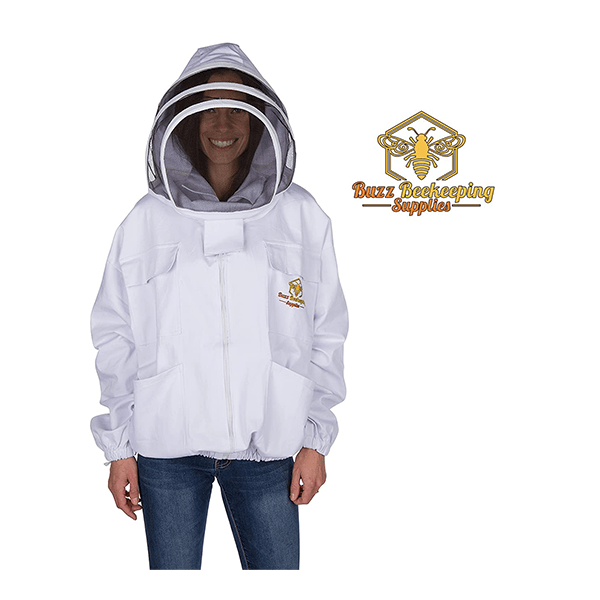
- Gloves: Selecting the right pair of beekeeping gloves is essential for safeguarding hands from stings while also offering dexterity. There are different options available for beekeepers to consider. Goatskin Bee Gloves – Goatskin gloves are valued for their exceptional tactile sensitivity, enabling beekeepers to handle delicate tasks with ease. These gloves provide both protection and dexterity, making them a popular choice. Cowhide Bee Gloves – Alternatively, cowhide gloves offer robust protection against stings due to their thick leather construction. These gloves are designed to provide maximum protection for beekeepers’ hands.
- Beekeeping Boots: Protecting the feet is equally important when tending to honey bee colonies. Beekeeping boots, specifically designed to keep bees from accessing the feet, are a vital addition to beekeeping supplies. Considerations for Beekeeping Boots – When selecting beekeeping boots, it is essential to consider factors such as sturdy construction, protective padding, comfort, and ankle support to ensure adequate protection and comfort.
- Beekeeping Veil: A reliable beekeeping veil is essential for safeguarding the face and neck from bee stings. These veils consist of fine mesh that allows for excellent visibility while preventing bees from reaching the skin. Veil Options – Beekeepers can choose between veils attached to beekeeping suits or jackets, as well as detachable veils, offering flexibility to suit individual preferences.
Combo Packs – Many times, beekeepers can purchase a combo pack of a bee suit and bee gloves at a discounted price, providing an all-in-one solution for protective clothing.
In conclusion, having the right beekeeping equipment is vital for successful hive management in Mississippi. From hive boxes and frames to protective clothing and honey extraction equipment, every aspect of beekeeping requires the right tools and supplies to ensure the well-being of the bees and the quality of the honey produced.
Beekeeping Tools
Beekeeping in Mississippi is a gratifying and captivating pursuit that necessitates the use of precise equipment for the effective management and care of honeybee colonies. As a beekeeper in Mississippi, it is pivotal to possess a well-stocked assortment of beekeeping tools to guarantee the smooth functioning of your hives.
- Hive Smoker: The smoker stands as a critical tool in every beekeeper’s arsenal, functioning to pacify honeybees during hive inspections. By emitting cool smoke that conceals the alarm pheromones released by guard bees, the smoker aids in tranquilizing the colony and diminishing the likelihood of stings. Furthermore, the smoke induces a feeding response in the bees, prompting them to consume honey and reducing their inclination to sting. Therefore, it is imperative for beekeepers to always carry a smoker and extra fuel to effectively manage their hives.
- Hive Tool: Another tool for beekeepers is the hive tool. This versatile instrument is employed to disengage and pry apart hive components during inspections. It facilitates the loosening of frames stuck together with propolis, a resinous substance produced by bees. With a flat blade on one end and a curved hook on the other, the hive tool is ideal for lifting frames, scraping off excess propolis, and removing burr comb. Its robust construction ensures that beekeepers can efficiently dismantle and reassemble their hives without causing any harm to the bees or the equipment.
- Bee Brush: While the smoker and hive tool serve functional purposes, the bee brush is primarily focused on the care and well-being of the bees. This soft-bristled brush enables beekeepers to gently relocate bees from specific areas during inspections without causing harm or stress. It aids in maintaining a calm environment and prevents unnecessary harm to the bees by avoiding crushing or injuries. Whether beekeepers need to delicately remove bees from frames, boxes, or other areas where they may cluster, a bee brush is an indispensable tool to uphold harmony between beekeepers and their valuable honeybees.
- Queen Marking Tools: Queen marking tools are pivotal for the identification and tracking of the queen bee within a colony. Typically comprising a small, colored plastic or metal marker, these tools are carefully applied to the queen bee’s thorax. The marking aids beekeepers in effortlessly locating and tracking the queen during hive inspections, minimizing the risk of inadvertently harming or misplacing her. The color code system established by beekeeping associations provides vital information regarding the age and year of the queen, enabling beekeepers to effectively monitor the health and longevity of their colonies.
Hive Feeders:
The Importance of Hive Feeders in Beekeeping
Beekeeping is a crucial practice for the health and productivity of bee colonies, and one of the essential aspects of beekeeping is the provision of supplementary food to bees. Hive feeders play a vital role in enabling beekeepers to provide the necessary nourishment to their bees, especially during times of scarcity or when establishing new colonies.
Understanding Hive Feeders
Hive feeders come in various types, each with its own unique characteristics and benefits. Let’s take a closer look at some of these types of hive feeders:
- Entrance Feeders: One commonly used type of hive feeder is the entrance feeder. These feeders are designed with small holes or slots and are placed near the hive’s entrance, allowing bees easy access to the supplemental food. They are favored for their ease of use and monitoring, ensuring that bees can consume the food without the risk of drowning.
- Boardman Feeders: Boardman feeders are popular among beginner beekeepers due to their simple design and practicality. Similar to entrance feeders, they are placed near the hive entrance and consist of a small jar with tiny holes or slits on the lid for bees to access the food easily. Boardman feeders can hold a relatively larger volume of food compared to entrance feeders, making them a convenient choice for providing supplemental nourishment to the bees.
- Top Feeders: For larger colonies or times when significant supplemental food is required, top feeders are a suitable choice. These feeders are placed directly on top of the hive, just beneath the outer cover, and are designed with floats or caps to allow bees to access the food without the risk of drowning. They are ideal for minimizing disturbance to the hive while ensuring the bees receive the necessary nourishment.
- Division Board Feeders: Division board feeders are unique in that they are placed within the hive itself, dividing the brood chamber. Inserted between frames, these feeders allow bees to access the food from inside the hive, particularly beneficial during unfavorable external conditions. By providing food directly inside the hive, this feeder type ensures that the bees’ nutritional needs are met while minimizing their exposure to external elements.
Extraction Equipment:
Beekeepers understand the vital role that extraction equipment plays in the process of harvesting honey from beehives. Having the right tools and apparatus is essential for ensuring effective and efficient honey extraction.
- Honey Extractors: Perhaps the most crucial piece of equipment for honey extraction is the honey extractor. This specialized device is designed to extract honey from honeycomb frames without causing any damage. Through the use of centrifugal force, honey extractors spin the frames to separate the honey from the comb. There are various types of honey extractors available, including manual and electric models, each offering its own set of advantages. Since most honey extractors are expensive, many bee clubs will have units they either loan or rent.
- Uncapping Tools: Before the frames are placed in the honey extractor, it is necessary to uncap the cells to release the honey. Uncapping tools are specifically designed for this purpose, coming in various forms such as uncapping knifes, electric uncapping knives, and uncapping forks. Beekeepers can choose the tool that best suits their preferred uncapping method and hive setup.
- Honey Filters: Once the honey has been extracted from the frames, it is crucial to filter it to remove any impurities or debris, thus ensuring a high-quality end product. Honey filters, also known as honey strainers or sieves, are fine mesh screens that trap unwanted particles while allowing the honey to pass through. By using honey filters, beekeepers can maintain the purity and clarity of their honey.
- Honey Buckets: After the honey has been extracted and filtered, proper storage is essential. Food-grade buckets are ideal for this purpose, as they are designed to meet strict food safety standards. These buckets are made from food-safe materials and have airtight lids, ensuring the honey remains fresh and free from contaminants. Beekeepers can store their harvested honey in these buckets until it is ready for packaging or consumption.
Food for Bees
Feeding your bees a balanced diet ensures their optimal health and productivity. While honey is their primary food source, supplemental feeding may be necessary in certain circumstances. Here are some common food options for your honeybees:
- Sugar Syrup: A Common Food Source – Sugar syrup is a widely used food source for feeding honeybees, especially in situations where supplemental feeding is necessary. To make sugar syrup, simply dissolve granulated sugar in water. The recommended ratio for spring and summer feeding is 1:1 (one part sugar to one part water), while a 2:1 ratio is recommended for fall feeding. It is crucial to use only granulated white sugar when preparing sugar syrup, as using honey, brown sugar, or other sweeteners may lead to potential disease.
- Pollen Substitute for Dietary Needs – Pollen substitute can be utilized to supplement the dietary needs of bees, particularly when natural pollen is not readily available. Commercially available pollen substitute can be mixed with water to create a patty-like consistency for bees to consume. However, it is important to note that natural pollen from a diverse range of flowers is always the preferred option over substitutes.
Pest Control Products for Beekeepers
Beekeeping is a rewarding hobby, but it’s essential to be aware of the potential threats that can affect the health of your bees. Pests and diseases can pose significant risks to honeybee colonies and must be managed effectively. Here are some crucial pest control products that every beekeeper should have in their toolkit.
Varroa Mite Treatments:
Varroa mites are one of the most significant threats to honeybee colonies. These parasitic mites feed on the bodily fluids of adult bees and their developing brood, weakening the bees and making them susceptible to viruses. Effective treatment is crucial for controlling Varroa mite infestations.
- Chemical Treatments: Chemical treatments, such as formic acid or oxalic acid, can be used to control Varroa mite infestations. These treatments are applied within the hive to target the mites while minimizing harm to the bees. It’s essential to follow the instructions carefully and use these products responsibly.
- Organic Treatments: For beekeepers preferring natural options, organic treatments are also available. Thermal treatments, thymol-based products, and essential oils offer organic alternatives for controlling Varroa mite infestations. These natural solutions provide effective pest control while minimizing the impact on the environment.
Wax Moth Control:
Wax moths can pose a significant threat to honeybee hives by infesting and damaging beeswax comb. They lay their eggs in the comb, and the larvae can cause extensive damage as they feed on the wax and silk. Effective control measures are essential for protecting beehives from wax moth infestations.
- Chemical Treatments: Chemical treatments such as paradichlorobenzene or freezing frames can effectively control wax moth populations. These treatments target the wax moth larvae, preventing damage to the beeswax comb and preserving the integrity of the hive.
- Regular Hive Inspection: Prevention is key when it comes to managing wax moth infestations. Regular hive inspections can help beekeepers identify early signs of wax moth activity and take prompt action to address any infestations. By closely monitoring the hives, beekeepers can implement proactive measures to prevent wax moth damage.
In conclusion, managing pests and diseases is an essential aspect of beekeeping. By incorporating these essential pest control products into their toolkit, beekeepers can effectively protect their honeybee colonies from threats such as Varroa mites and wax moths. Regular monitoring and proactive management are crucial for maintaining the health and vitality of beehives.
Tips for Properly Maintaining Beekeeping Supplies
- Proper Storage and Maintenance: Proper storage and maintenance are crucial for prolonging the lifespan of beekeeping supplies. It is important to store the equipment in a dry and secure location to prevent damage and deterioration. Regular maintenance tasks such as cleaning and oiling can also help in extending the lifespan of the supplies.
- Regular Cleaning and Inspection: Regular cleaning and inspection of beekeeping supplies are necessary to ensure that the equipment is in good working condition and free from any potential contaminants. This will help to maintain the effectiveness of the supplies and ensure the well-being of the bees.
- Upgrading and Replacing Worn-Out Equipment: Over time, beekeeping supplies may become worn out and in need of replacement. Upgrading to newer and more efficient equipment can be beneficial for both the bees and the beekeeper, as it can enhance the efficiency of the beekeeping practices.
- Staying Informed About New Technologies: The field of beekeeping is constantly evolving, and beekeepers should stay informed about new technologies and innovations that can improve their practices. Keeping abreast of the latest developments in beekeeping can help beekeepers to enhance their knowledge and skills.
- Resourcefulness and DIY Solutions: In some cases, beekeepers may need to get creative and come up with do-it-yourself (DIY) solutions to address specific challenges or equipment needs. Being resourceful and innovative can help beekeepers to overcome obstacles and improve their beekeeping practices.
State Association
The state association is the Mississippi Beekeepers Association.
Buying Bees in Beekeeping Supplies Mississippi
Where to buy bees and nucleus hives (nucs) in Beekeeping Supplies Mississippi?
One of the best places to purchase queen bees, packaged bees and nucs is your local bee club.
Engaging with a beekeeping club can greatly enhance your knowledge, skills, and overall experience as a beekeeper.
Here is a list of local bee clubs in Mississippi:
- Attala-Leake County Beekeepers
- Central Mississippi Beekeepers Association
- Delta Area Beekeepers Association
- East Central Mississippi Beekeepers Association
- Gulf Coast Beekeepers Association
- Lowndes County Beekeepers
- Marion County Beekeepers Association
- Meridian Beekeepers Association
- Mississippi Gulf Coast Beekeepers Association
- Monroe County Beekeepers
- North Central Mississippi Beekeepers Association
- North Mississippi Beekeepers Association
- Northeast Mississippi Beekeepers Association
- Pine Belt Beekeepers Association
- Red Creek Beekeepers Association
- South-East Beekeepers Association
- Southwest Mississippi Beekeepers Association
Conclusion
Quality beekeeping supplies are the backbone of a successful beekeeping operation in Beekeeping Supplies Mississippi. By investing in high-quality equipment, making informed choices, and properly maintaining supplies, beekeepers can ensure the well-being of their bees and the sustainability of their practices.
Whether you’re just starting or have years of experience, beekeeping supplies play a crucial role in the success of your beekeeping venture. Be sure to support local beekeeping communities and explore the resources available for further learning and support in Mississippi and beyond.
FAQ’s:
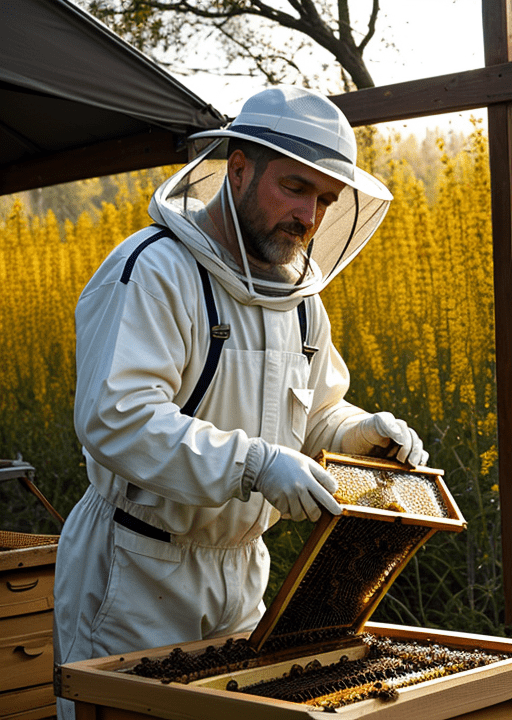
What are the essential beekeeping supplies I need to start in Mississippi?
- To begin beekeeping in Mississippi, you will require the following basics: beehive boxes, frames, hive tools, bee suit/protective gear, smoker, entrance reducer, hive feeder, queen excluder, and a honey extractor.
When should I start beekeeping in Mississippi?
- Spring is the best time to start, but you can start researching and purchasing beekeeping supplies in the winter months. Then you will be prepared to purchase bees in early spring.
- Remember, beekeeping practices can vary based on specific locations and beekeeping goals. It is advisable to consult local beekeeping associations or experienced beekeepers for more precise guidance and to adapt to regional conditions.
Where can I find reliable bee supplies in Beekeeping Supplies Mississippi?
- There are numerous places to find bee supplies in Mississippi. You can check out local beekeeping supply stores, agricultural supply centers, or even online platforms dedicated to beekeeping equipment. It’s important to choose reliable sources that offer high-quality products to ensure the success of your beekeeping venture.
Are there any specific regulations or permits required for beekeeping in Mississippi?
- Yes, beekeeping regulations may vary among states and counties. It is advisable to check with the Mississippi Department of Agriculture or your local beekeeping association for specific guidelines, registration requirements, or permits needed to maintain beehives legally.
What protective gear is necessary for beekeepers in Mississippi?
- As a beekeeper in Mississippi, it is crucial to prioritize safety. Wear a beekeeping suit or jacket with protective veil and gloves to shield yourself from bee stings. A veil attached to the suit will provide added protection for your face and neck.
How do I control pests and diseases in my bee colonies?
- Maintaining healthy hives requires effective pest and disease management. Monitor your bees regularly for signs of mites, hive beetles, varroa, or other pathogens. Consider treating your colonies using organic or chemical methods recommended by local beekeeping associations or state extension services.
Why is it important to invest in quality beekeeping supplies?
- Quality beekeeping supplies are essential for the health and well-being of the bees, the success of the beekeeping venture, and the sustainability of beekeeping practices in Beekeeping Supplies Mississippi.
What should I look for in a beekeeping supplier?
- When you are looking for the best beekeeping supplies in Beekeeping Supplies Mississippi, it is important to keep a few things in mind. First of all, you want to make sure that the beekeeping supplies you purchase are of the highest quality. It is also important to make sure that you are buying supplies from a reputable beekeeping supplier.
